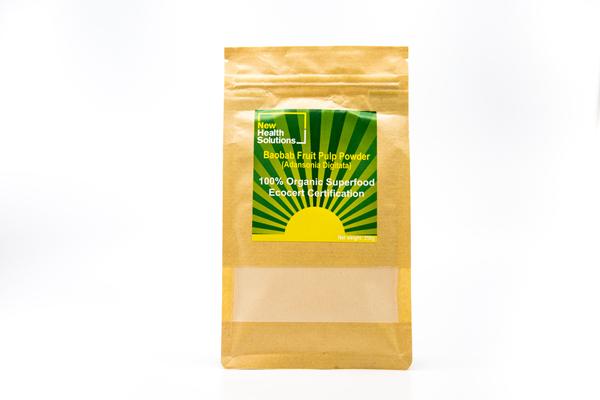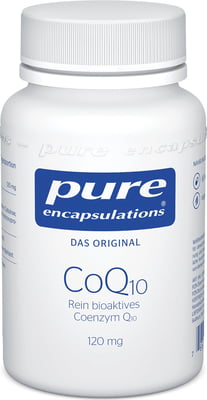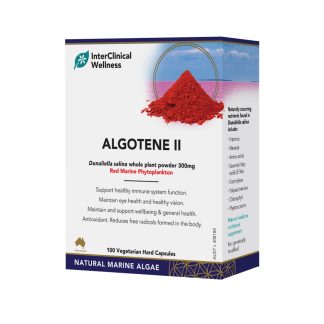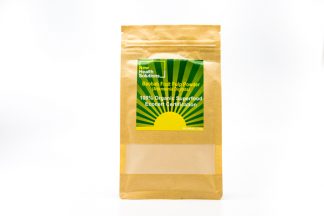Baobab Fruit Powder – 250 g
$19.95 inc. GST
Botanical name: Adansonia digitata
Colloquial name: Monkey bread, bouye (wolof)
Quality : Pure, natural, without any additive; available with European organic certificate
Country of origin: Senegal
Culture: Agro forestry – Fair Trade -Certified Organic
Baobab fruit pulp powder provides vital high fiber, lots of antioxidants, minerals, vitamins, iron and essential amino acids. The fruit is found inside hard pods that hang upside down from the tree. It has a citrus flavor.
Baobab fruit pulp is a good source of calcium, potassium, magnesium, manganese, phosphorous, zinc and iron and is alkalising.
It contains large amounts vitamin C and vitamins B (B1, B2 and B3).The fibre acts as a prebiotic therefore helping maintaining healthy gut bacteria.
1. May Help in Weight Loss
* Baobab fruit may reduce the absorption of sugar in the body. The reduced absorption of sugar may prevent obesity.
* The high content of fiber found in baobab fruit gives a feeling of satisfaction and fullness therefore eliminating unhealthy snacking habits.
* Obesity can also be caused by inflammatory problems that are prevalent in your body. Therefore, the anti-inflammatory properties of the baobab fruit mayl help reduce the abdominal fat and may reduce the inflammation in the body.
A study conducted by Oxford Brookes University found that polyphenol-rich baobab fruit extract, baked in bread, reduced starch digestion and glycemic response in humans.
2. Boosts Immune System
Because of the unique blend of essential minerals and vitamins including the high levels of vitamin C, baobab fruit may boost the immune system.
3. Improves Brain Health and nervous system Health
Stress is the dominant problem in our society. The presence of important vitamins, minerals and antioxidants in baobab fruit may be nourishing and relaxing the nervous system and the brain, may prevent the development of neurological problems, by improving sleep and reducing stress levels.
4. Improve Heart Health
The high fiber content of the baobab is binding with the bad cholesterol and eliminating through the faeces, therefore may reduce the risks of developing serious heart problems.
The high level of potassium and magnesium may play a vital role in maintaining normal blood pressure
5. Powerful Anti-inflammatory
Many serious illnesses are caused by the excessive inflammation in the body. The antioxidants and anti-inflammatory properties found in the baobab fruit may keep them at bay.
6. Prevents Arthritis
Due to the anti-inflammatory properties, the baobab fruit is considered a useful addition to the diet and may prevent arthritis.
7. Improves Digestion
There are two types of fiber, soluble and insoluble. Baobab fruit has both soluble and insoluble. These fibers may improve the function of the digestive tract and may act as a prebiotic which is the food for the good gut bacteria
8. Improves skin health
The rich content of Vitamin C and anti-oxidants may help the skin stay firm glowing and radiant. The Baobab fruit may prevent sagging and wrinkles from developing. The Baobab oil is just pure magic when added to the fruit powder for a mask, check our recipe!
9. Prevents Diabetes
As mentioned before, the baobab fruit has a special form of sugar that may help maintain stable blood sugar levels and the rich soluble fibre may prevent the intestines from absorbing too much sugar.
10. Improve Teeth and Bone Health
The high content of calcium found in baobab fruit is higher than in milk and may prevent developing osteoporosis as well as dental decay.
It is considered the most complete and nutritious food of our modern times to boost the nutritional status for the whole family.
Food Use: The pulp is directly used as an ingredient in various preparations for its binding, thickening and acidifying properties: cereal preparations such as porridge or couscous (for example, the “mutchoyan” in Benin or the “ngalakh” in Senegal), sauces or creams of accompaniment (for example, sweetened cream with grilled and crushed groundnuts in Senegal), sweet preparations cooked with local fruits (mango, orange, ditax, etc.).
It is also used for making smoothies, juices, cereal bars, jams and other similar products. See the recipes!
Use in cosmetic: Because of its smoothing and emollient properties, the pulp of baobab can be used in the form of soap, creams or masks, but also for anti-aging car
Traditional Use: Studies on its medicinal use showed that the pulp had anti-inflammatory, antipyretic (reduces temperature), analgesic (relieves pain) properties, anti-diarrheal and anti-dysentery properties, and a potential hepatic-protective effect (protect the liver). Baobab has traditionally been used in African populations to relieve diarrhoea, constipation and dysentery.





